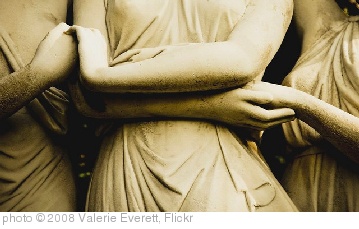Who Stole My Happiness?
by Peter Rollins
posted 12/12/11
One of the first problems that we are confronted with concerning the “Thing” which we imagine will bring us fulfilment (money, fame, health, relationship etc.) is, of course, that we can’t seem to ever get our hands on it. If we do reach out and grasp we open our hands and find out that it isn’t actually the “Thing” after all (because it has not satisfied in the way we fantasised). This is not to say that a form of happiness and satisfaction is beyond us, just that the imagined fulfilment of desire is an impossible dream (that would turn out to be a nightmare were it ever possible). The belief in something that can fulfil us (in theological terms “the idol”) is then oppressive because it always seems out of reach, robbing our current situation of meaning.
This is, of course, a rather mundane and well-documented phenomenon. However what is reflected on less is the way that we imagine others having the “Thing” and how this affects the way we relate to them.
Take the example of a minister standing in front of his congregation preaching against the sexual sins of the world. Let us imagine him working himself into a sweat about the orgies, sex parties and deviant behaviour going on just beyond the walls of the church. One of the striking things about this is the way that all of his pent up emotion and moral indignation often seems like nothing more than a thin veil hiding the truth that he is jealous of all the fun they are having. They are having so much pleasure while he is not, they have the “Thing” that he doesn’t.
To approach this from a different angle I recently talked with a woman who broke up with someone and subsequently felt bad because she knew that he was very unhappy as a result of the split. She told me of how, a couple of months later, she found out from a friend that he was much better and in a new relationship. When she heard the news she expressed joy to her friend. However she admitted to me, and herself, that the initial “sorrow” she felt at him being unhappy actually contained a form of hidden pleasure while the “pleasure” she had at thinking he was happy veiled a sorrow.
Her feelings had nothing to do with her disliking the man or not wanting him to prosper; it was rather connected to her (implicit) belief in the "Thing."
This is also seen to play out when someone breaks up with us. It is not uncommon to imagine that the other person is out partying all the time, meeting new people and generally having a ball. All the while we are unhappy, unstable and unable to leave the house. They appear to have the pleasure that we lack and we resent them for it, even wishing them harm. More than this we are willing to hurt ourselves in order to rob them of their pleasure (the most extreme form being suicide – where we will end our own life to rob them of the "Thing").
The point of these brief comments is to draw out how our belief that there is something which can satisfy our desire and render us whole, [which] is not only oppressive because (i) we can never seem to grasp it, but also is oppressive because (ii) of the way that we think others have. When we are truly able to see the other as being just as riven with desire and lack as we are then reconciliation becomes more possible.*
This is a subject that I go into in much more depth in my next book (due out October 2012).
* * * * * * * * * * * * *
*If I might attempt to complete Peter's thought, we might imagine ourselves no less fulfilled or happy than another person similarly plague by personal thoughts of unfulfillment and unhappiness. Each of us have our own personal "idols and meaning" issues. Each of us are just as torn as the other. But in different ways. This is a sin issue. Rather than being content with life's many little perfections of beauty around us we always want more from God. Our pride and ego would drive us to lust and discontent. These are different than dreams and passions which would drive us to God's re-purposing of our lives. One is an idol. The other is worship.
R.E. Slater
December 15, 2011
